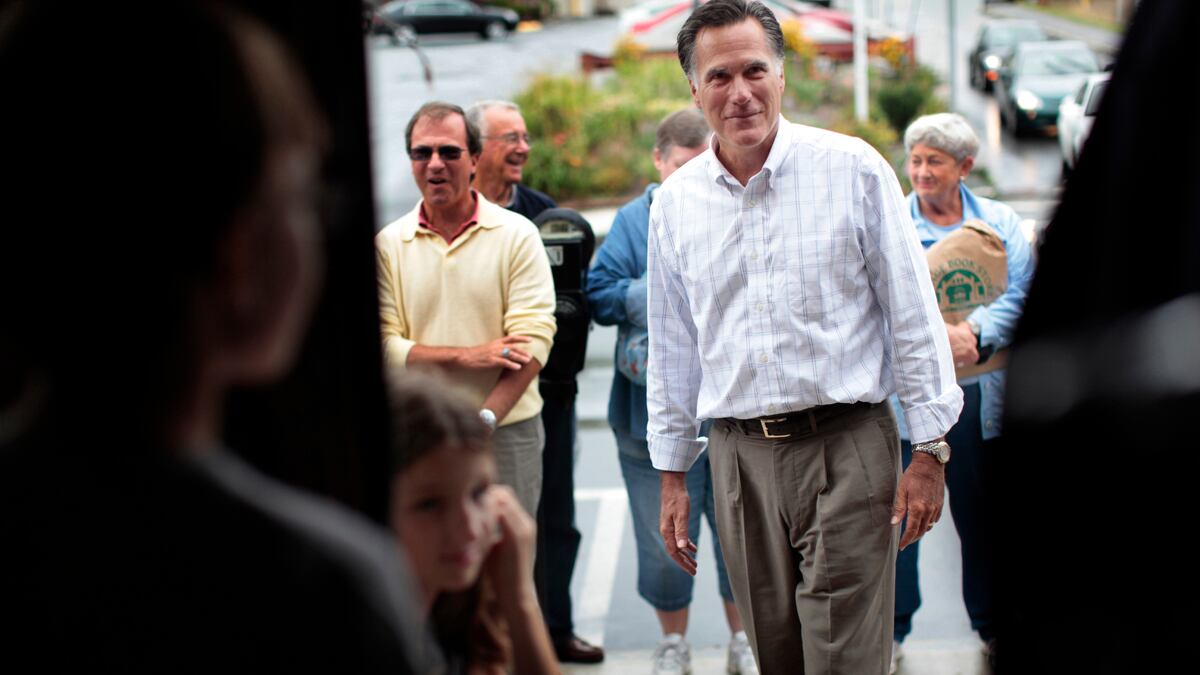It was the final day of the 2004 presidential campaign and John Kerry, trying to show his hard-traveling press corps some love, was handing out Team Kerry fleece jackets as mementoes. The sentimentality of the moment faltered slightly when he got to me, handed me a jacket and told me—in a really nice, solicitous way—that I might need a larger size. His aides winced.
Then he dug the hole deeper. I was not as small as my seatmate, he said. I had broader shoulders. Et cetera. Barely suppressing their eye-rolls and giggles, his aides finally hustled him away, leaving the rest of us to wonder: Could you come up with anything worse to say to a woman than “you might need a larger size”?
The incident was amusing, even to me—maybe because it turned out I did not need a larger size, or maybe because the exchange was so classically Kerryesque. It’s been on my mind as Mitt Romney, in his second presidential outing, keeps adding to his digital library of remarks that are insensitive, inappropriate or not nearly as funny to others as they are to him.
You might expect charming or at least passable small talk to be a gateway skill for a politician. And some of them are silky-smooth at it, Bill Clinton being the epitome of the breed. At the other extreme is Richard Nixon, he of the wingtips on the beach. Small talk, New York Magazine said in a 1968 article about Nixon, is “a talent at which he is as naturally gifted as, say, the late Harpo Marx.”

If you find it difficult or painful to relate to your fellow man, why go into politics? Yet sometimes people do, and like Nixon, sometimes they even make it to the top. Maybe they crave power, or they truly believe they are the best person for the job, or they are driven by passionate convictions, or they want to prove things to themselves and others. Whatever the reason, their need for politics, or their love of it, is stronger than their unease or even agony in social settings.
Robert Gilbert, author of The Tormented President: Calvin Coolidge, Death and Clinical Depression, quotes Coolidge as saying that “I am as much interested in human beings as one could possibly be, but it is desperately hard for me to show it.” Yet Coolidge’s affinity for politics was so strong that he became a city councilman, state legislator and mayor from Northampton, Mass., a lieutenant governor, a governor, a vice president and a president.
Gilbert, a presidential scholar at Northeastern University, says Coolidge “adopted the style” of an extrovert in seeking his first low-level offices. “He forced himself to ring doorbells so he would have to talk to people,” he says. “He was not fun to talk to, but people liked him. He was a down-to-earth, ordinary guy.” Gilbert adds that “sometimes it’s easier for an introverted person to talk to 1 million people, or 10,000, than it is to talk to one or two people. Someone like Nixon could speak to big crowds. He did it all the time.”
Modern White House candidates face a nation that has embraced the personal presidency and expects to have an emotional or at least social connection with those who seek the Oval Office. To grasp the change, says Stanley Renshon, a political scientist at the City University of New York Graduate Center, consider national war hero Dwight Eisenhower. “He ran his campaign based on who he was and what he accomplished. He wasn’t required to do retail politics at the level that we now have. He wasn’t forced to go booth to booth in the local diner,” says Renshon, who is also a psychoanalyst and author of the upcoming book Barack Obama and the Politics of Redemption.
The proliferation of debates, roundtables, town halls and yes, diner stops, along with YouTube and cable, means we are all able to cringe right along with those in the room when shy or awkward candidates engage in give-and-take with voters. A good example came during Romney’s last campaign, when he tried to explain at an eastern Iowa campaign stop why none of his five adult sons was in the military. He started out fine, saying everyone makes different decisions and he respects and values those who have decided to serve.
But then Romney added, “It’s remarkable how we can show our support for our nation, and one of the ways my sons are showing support for our nation is helping to get me elected, because they think I’d be a great president.” And then he catapulted right off the out-of-touch meter: “My son, Josh, bought the family Winnebago and has visited 99 counties, most of them with his three kids and his wife. And I respect that and respect all of those in the way they serve this great country.” Fight in Iraq, drive the RV around Iowa, whatever, we’re all serving.
There’s already a classic in the archives this year from Romney’s recent meeting with unemployed people at a coffee shop in Tampa. “I should tell my story. I’m also unemployed,” Romney told them, chuckling, and held up the book Aim for Jobs: Your Complete Job Search Plan. “Are you on LinkedIn?” one man asked. “Yes, actually, and I’m networking,” Romney said. Laughter all around the table.
But how funny was it, really? Romney is hugely wealthy and doesn’t need a job. He has homes worth an aggregate tens of millions of dollars near Boston, on Lake Winnipesaukee in New Hampshire and on the beach in La Jolla, Calif. In fact, according to the San Diego Union Tribune, he is planning to tear down the beach house and rebuild it at four times the size. Seems like bad politics to draw attention to facts like that by suggesting you are in the same boat as regular people without jobs. The incident reminded me of Kerry telling an Iowa waitress that his daughter had been a waitress, too. Right. The highly educated daughter of a senator running for president, stepdaughter of an heiress, aspiring film director. Not the same thing!
Renshon describes such remarks as a clueless reach for common ground by politicians more accustomed to relating to affluent people in Washington or the business world. “You have to ask the question of what’s behind the tone-deafness,” he says. “It’s the adult experience. They just don’t spend much time in those kinds of circumstances. It’s sort of like visiting a foreign country.”
Jokes should be a universal language, but Romney, alas, has demonstrated a humor gap. Should he really be jumping out of a photo op with waitresses and “joking” that someone pinched his rear end? (Yes, that happened). Or telling a restaurant owner that she should serve her eggs with Hollandaise sauce in hubcaps, “because there’s no plates like chrome for the hollandaise”? (Hint: That’s a punchline). Or praising a man at a company in Merrimack, N.H. for his “nice choice” in girlfriends, as the girlfriend blushed (yes, she was right there)?
It must be said that Romney remains a piker compared to Nixon, whom Renshon calls “introspective almost to the point of social autism.” There are two especially excruciating examples of Nixon trying, and failing, to be personable. One was when a cop in his motorcade was lying in the road after being thrown from his motorcycle. Attempting to show compassion, Nixon asked him how he liked his job. The other was during a break in television interviews taped in 1977, when Nixon asked David Frost whether he had done any fornicating over the previous weekend. Frost later said Nixon was astonishingly “hopeless” at small talk.
That didn’t prevent the pre-Watergate Nixon from opening diplomatic relations with China, negotiating and signing an Anti-Ballistic Missile treaty with the Soviet Union, enforcing desegregation of Southern schools and signing laws that created the Environmental Protection Agency, the Occupational Safety and Health Administration and Social Security disability benefits. Clearly you can be elected president and get things done even if you’re not a people person.
That’s encouraging for Romney and other schmooze-challenged candidates. Still, for the good of the nation and their own legacies, please, let’s have better jokes or no jokes at all.






